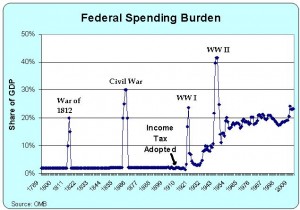There have been some unfortunate and dark days in American history, but what was the worst day?
Some obvious choices include December 7, when the Japanese bombed Pearl Harbor, and September 11, when the terrorists launched their despicable attack.
Another option (somewhat tongue in cheek) might be January 20 since Republican partisans would say that’s the day that both Jimmy Carter and Barack Obama became President while Democratic partisans would say that’s the day Ronald Reagan became President.
But allow me to suggest that today, October 3, should be a candidate for America’s worst day.
Why? Because on this day in 1913, one of America’s worst Presidents, Woodrow Wilson, signed into law the Revenue Act of 1913, which imposed the income tax.
The law signed that day by President Wilson, to be fair, wasn’t that awful. The top tax rate was only 7 percent, the tax form was only 2 pages, and the entire tax code was only 400 pages. And a big chunk of the revenue actually was used to lower the tax burden on international trade (the basic tariff rate dropped form 40 percent to 25 percent).
But just as tiny acorns become large oak trees, small taxes become big taxes and simple tax codes become complex monstrosities. And that’s exactly what happened in the United States.
We now have a top tax rate of 39.6 percent, and it’s actually much higher than that when you include the impact of other taxes, as well as the pervasive double taxation of saving and investment.
And the relatively simply tax law of 1913 has metastasized into 74,000 pages of Byzantine complexity.
Not to mention that the tax code has become one of the main sources of political corruption in Washington, impoverishing us while enriching the politicians, lobbyists, bureaucrats, and interest groups. Or the oppressive and dishonest IRS.
However, even though I take second place to nobody in my disdain for the income tax, the worst thing about that law is not the tax rates, the double taxation, or the complexity. The worst thing is that the income tax enabled the modern welfare state.
Before the income tax, politicians had no way to finance big government. Their only significant pre-1913 sources of revenue were tariffs and excise taxes, and they couldn’t raise those tax rates too high because of Laffer Curve effects (something that modern-day politicians sometimes still discover).
 Once the income tax was adopted, though, it became a lot easier to finance subsidies, handouts, and redistribution. As you can see from the chart, the federal government used to be very small during peacetime.
Once the income tax was adopted, though, it became a lot easier to finance subsidies, handouts, and redistribution. As you can see from the chart, the federal government used to be very small during peacetime.
But as the decades have passed, the Leviathan state in Washington has grown. And in the absence of genuine entitlement reform, it’s just a matter of time before the United States morphs into a bankrupt European-style welfare state.
And as government becomes bigger and bigger, diverting more and more resources from the productive sector of the economy, we can expect more stagnation and misery.
That’s why October 3 is an awful day in American history. All the bad results described above were made possible by the income tax.
